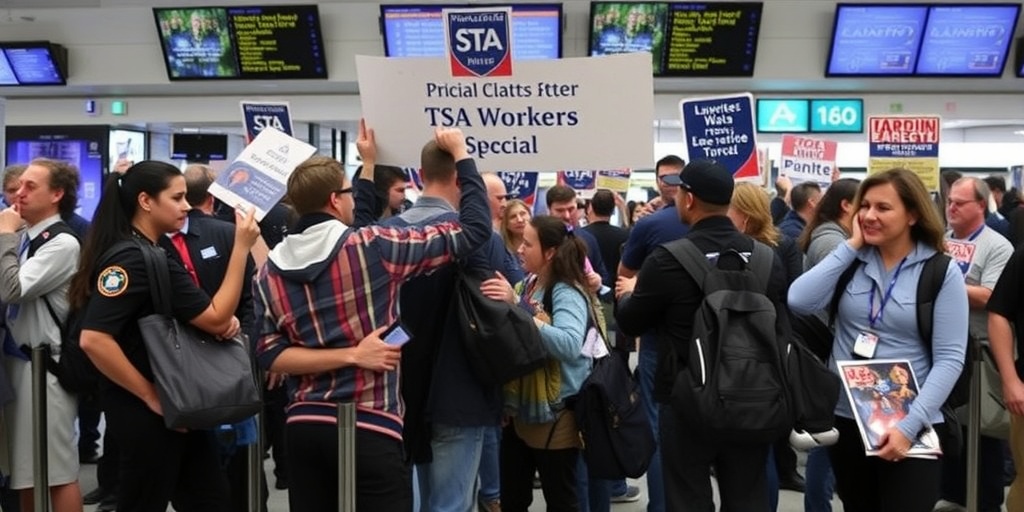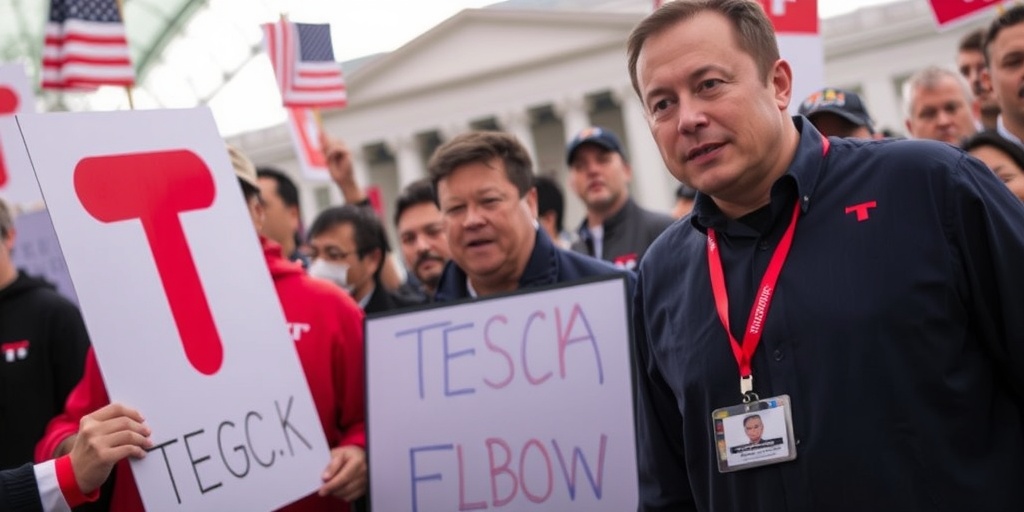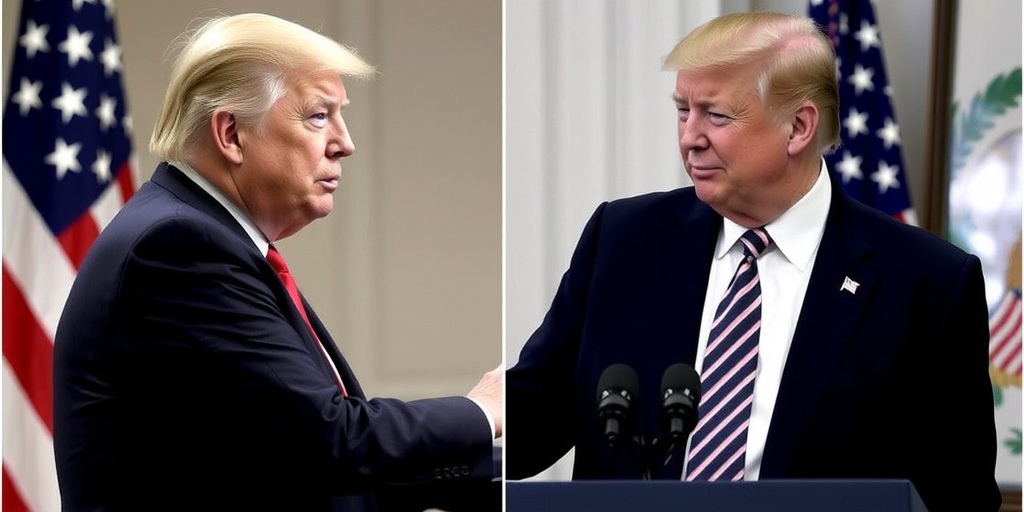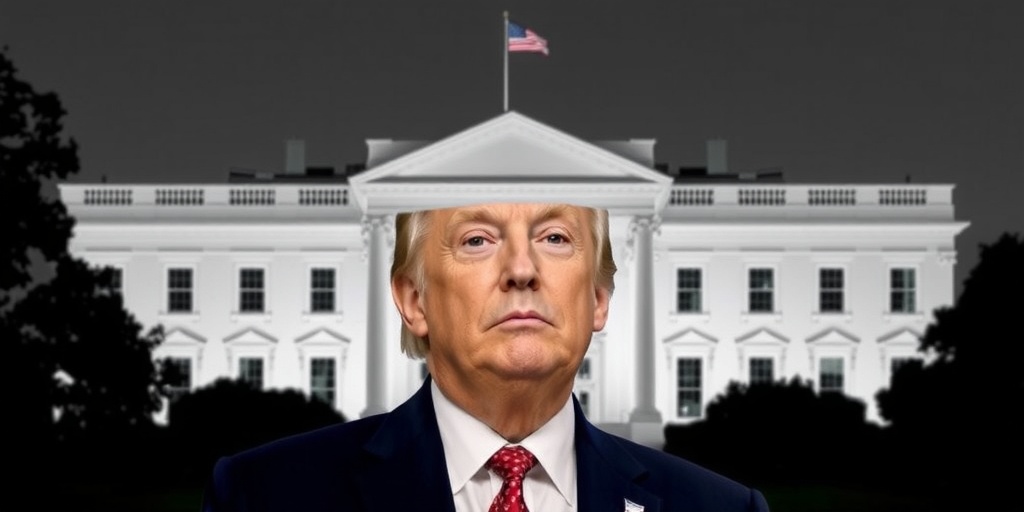Now Reading: Homeland Security Ends TSA Workers’ Union Contract
-
01
Homeland Security Ends TSA Workers’ Union Contract
Homeland Security Ends TSA Workers’ Union Contract

Department of Homeland Security Ends Collective Bargaining Agreement with TSA Workers, Prompting Outrage and Legal Challenges
In a significant development that has sent shockwaves through the federal workforce, the Department of Homeland Security (DHS) announced on Friday that it is terminating its collective bargaining agreement with employees of the Transportation Security Administration (TSA). The DHS claims that this union contract has been a hindrance to the safety and security of travelers across the nation.
This recent decision is part of a broader trend observed during President Trump’s administration, which has been characterized by efforts to weaken labor protections for federal employees. The American Federation of Government Employees (AFGE), which represents approximately 47,000 TSA workers as well as hundreds of thousands of other federal employees, has expressed outrage over the termination. They assert that the administration’s actions are illegal and do not genuinely pertain to safety concerns, but rather are a pretext for undermining the rights of workers who belong to unions.
Industry experts believe that the termination of the collective bargaining agreement may lay the groundwork for an eventual reduction of TSA personnel or even the privatization of the agency itself. Notably, Project 2025, a conservative policy framework that President Trump distanced himself from during his campaign, has included recommendations for privatizing the TSA. The agency, which employs around 50,000 workers, plays a critical role in securing America’s airports, highways, and passenger rail systems, having been established in response to the September 11 attacks in 2002 before being folded into the DHS the following year.
In a statement regarding the decision, the DHS claimed that a small number of “poor performers” within the TSA have been exploiting union benefits. They suggested that too much time spent on union-related activities has detracted from the vital security work necessary to protect the traveling public. The department asserted, “Eliminating collective bargaining removes bureaucratic hurdles,” and indicated that the union had significantly constrained efforts to enhance public safety.
Union president Everett Kelley vehemently criticized the DHS’s rationale, opining that the motivation behind the decision is not rooted in genuine concerns for operational efficiency or traveler safety. Kelley stated, “This is merely a pretext for attacking the rights of regular working Americans across the country because they happen to belong to a union.” The AFGE’s legal team is currently reviewing options to challenge the DHS’s actions in court, signaling a likely legal battle ahead.
Rebecca Givan, a labor studies professor at Rutgers University, emphasized the unprecedented nature of the DHS’s move to revoke a collective bargaining agreement. She predicted that such actions would not only be contested in court but would also have rippling effects throughout the federal workforce. “For the government to say, ‘We no longer abide by legally binding contracts’ creates uncertainty and insecurity across the workforce,” Givan observed.
Concurrently, TSA employees have recently faced additional scrutiny, including a request to report their work achievements in response to a directive from Elon Musk for federal employees. This request surfaced just as TSA workers were preparing for one of the busiest travel seasons of the year, raising concerns about workforce morale and the prioritization of security responsibilities.
Notably, this move by the DHS comes on the heels of a collective bargaining agreement reached during the Biden administration in May of the previous year. That agreement, which improved bereavement leave and made it easier for employees to take unscheduled leave, was seen as a significant step forward for TSA workers who had historically lacked the protections afforded to many other federal employees. The contract was heralded as the first comprehensive agreement negotiated by the TSA workers’ union.
Labor experts, such as John Logan from San Francisco State University, view the Trump administration’s withdrawal from this agreement as an alarming trend, signifying a broader message to federal agencies that they can disregard previously established legal obligations. “It’s really a big deal,” Logan remarked, underscoring the implications of such a decision for labor relations across government sectors.
The American Federation of Government Employees, along with other labor advocates, is expected to mount a robust challenge to the DHS’s decision, with calls for solidarity from labor unions nationwide. The outcome of this dispute could set a precedent affecting not only TSA workers but also the rights and protections of federal employees across the country. As this story develops, the implications of the DHS’s actions will likely resonate far beyond the confines of the TSA, prompting a reevaluation of labor relationships within the federal government as a whole.
Stay Informed With the Latest & Most Important News
Previous Post
Next Post
-
 01New technology breakthrough has everyone talking right now
01New technology breakthrough has everyone talking right now -
 02Unbelievable life hack everyone needs to try today
02Unbelievable life hack everyone needs to try today -
 03Fascinating discovery found buried deep beneath the ocean
03Fascinating discovery found buried deep beneath the ocean -
 04Man invents genius device that solves everyday problems
04Man invents genius device that solves everyday problems -
 05Shocking discovery that changes what we know forever
05Shocking discovery that changes what we know forever -
 06Internet goes wild over celebrity’s unexpected fashion choice
06Internet goes wild over celebrity’s unexpected fashion choice -
 07Rare animal sighting stuns scientists and wildlife lovers
07Rare animal sighting stuns scientists and wildlife lovers





















